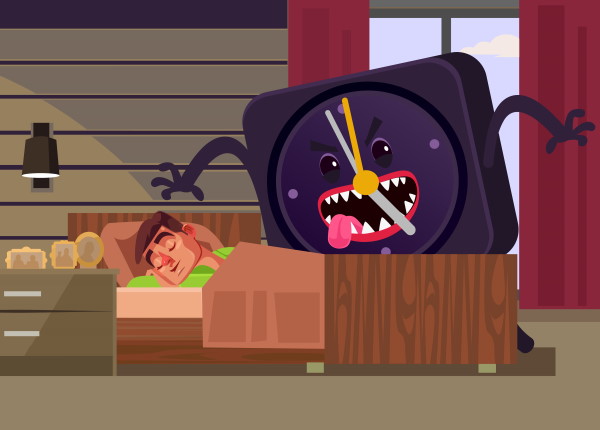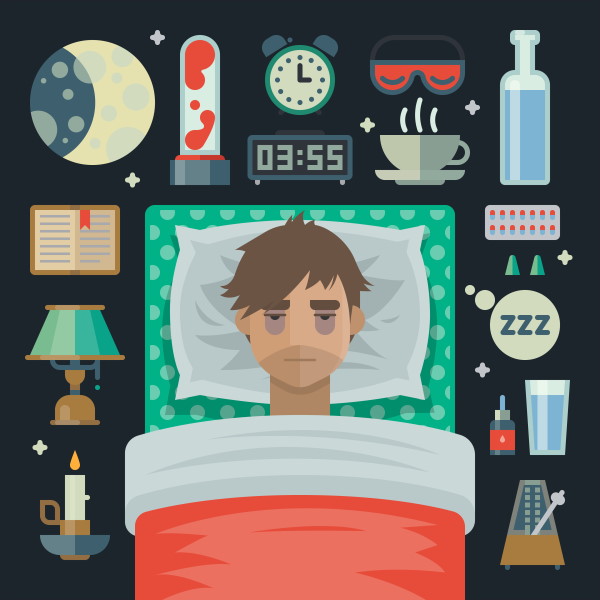
Dead at midnight, a blaring sound filled my ears. Adrenaline coursed through my veins. Had the emergency services arrived at my house? Thankfully not. The blast came from my back-up alarm, which I’d knocked on during a bedside table clean. I patted my annoyed better-half in sympathy and eventually went back to sleep. The next morning I woke to the low-volume buzz of my usual default radio alarm and then rushed off into the next day.
But I hate to admit it—I had forgotten to turn off the midnight alarm. It hit my ears in a rude awakening at 12 am. again. This time I gritted my teeth. Angry and cortisol-fuelled. It would take ages to relax back into a slumber.
There are many strategies to improve both the quantity and quality of our sleep. Here are seven areas that will help, each starting with a letter from the word DREAMER:
- DIET
- ROUTINE
- ENVIRONMENT
- ACKNOWLEDGEMENT
- MEDICINE
- ENJOYMENT
- RESOURCES
DIET
What and when you eat and drink may influence how well you sleep. It’s best to stop eating two hours before bed. One reason is to avoid indigestion and reflux, which can make lying down uncomfortable. Other notorious sleep snatchers are sugar, caffeine, nicotine and alcohol:
- Sugar is a stimulant and will give an energy surge. It increases inflammation in the body, which can make it harder to relax. It can also increase urination.
- Caffeine can delay the timing of your light-related body clock, (part of our circadian rhythm). Because it’s a stimulant, studies show it can delay your sleep-time up to six hours. It depends on the individual, however, so it’s worth testing your own ideal coffee consumption pattern.
- Smoking is also a stimulant and can disrupt sleep cycles.
- Alcohol can interfere with REM sleep and increase urination.
ROUTINE:
Try to keep a regular bedtime routine.
- Go to bed at a similar time each night—at least during the week. Remember my alarm clock saga? Can you guess what time I woke up the third night? Yes, I woke again at midnight for the next few nights.
- Remove as many digital appliances as you can. Avoid reading a digital device before going to bed. Watching a screen is like looking at the sunrise and can disturb our circadian rhythms. If you still wish to look at a screen, like I do, set the Display and Brightness to the Night Shift setting. Put your phone on silent unless you need to use an app or alarm during the night.
- A wind-down routine is helpful for sleep. I don’t write after 9pm, unless I have a deadline because I can’t relax with an active mind.
- Finish the day with a few favourite stretches or a book you enjoy.
- Deep-breathe and think about the good things of the day you can feel gratitude for. There’s always something.
A note on jetlag: Your internal clock signals when to be awake and when to sleep. Crossing time zones confuses the original ‘setting’ in your body. I try to organise my arrival at an overseas destination with an extra day to chill and relax through the exhausted and sickening feeling. If you’re speaking at a conference and struggling, let the audience know that it’s actually 2 am. for you. They’ll understand. However, jetlag affects people in different ways and some people seem to power into the new time zone with ease.
ENVIRONMENT:
Create a soothing environment for sleep.
- If you live in a hot climate, keep the bedroom as cool as possible during the day, so it’s comfortable for bedtime.
- If in a cold climate, warm the air and bed ahead of time.
- Dim the light in the room.
- Turn off all notifications and blinking lights.
- Close windows that transmit outside traffic or loud noises.
- Play soothing music.
ACKNOWLEDGEMENT:
If you can’t sleep, keep calm and acknowledge it. Getting angry or anxious releases cortisol, which is a primary stress hormone as well as an important regulator hormone. It can highjack your thoughts and create the fight-or-flight response.
A ruffled mind makes a restless pillow. Charlotte Bronte.
Here are some strategies you can follow during and after the acknowledgement of your situation:
- Rest your body and direct your thoughts mindfully on the positive path of gratitude for the good things that have happened during the week.
- If you don’t want to lie in bed, get up and read, or occupy the time with an activity you enjoy until you are ready to try again.
- Worried you’ve forgotten to do something? Have a new idea you don’t want to forget? Keep a notebook beside the bed for jotting notes for the next day.

MEDICAL:
- It’s important to see a medical professional if you’re having ongoing sleeping issues. Sleep deprivation can cause serious health problems, some of which are diabetes, heart attack or stroke, high blood pressure, depression and low sex drive. It can also cause moodiness, irritability, and make it dangerous to drive. https://www.thezebra.com/resources/research/drowsy-driving-statistics/
- I should mention sleeping tablets in this post. Taking sleeping tablets can be a slippery slope and lead to dependence, or even greater sleep deprivation. Jordan Peterson talks openly about the devastating side-effects he experienced when he took sleeping tablets during his wife’s illness. If you need to take tablets occasionally or during a period of illness, ask your medical professional for advice. There are different brands, all with different ingredients and side effects. A tip would be to take them only once or twice a week, if desperate.
ENJOYMENT:
A refreshing and healing sleep is something to aim for. It should be enjoyable, and a bedtime ritual can add to the pleasure.
- Declutter your bedroom.
- Make the room a haven from the outside world, a room you love to spend time in.
- Make sure you’ve sorted out any emotional issues with your family members well before bedtime.
- Try writing in a journal. Record feelings, thoughts and ideas to clear the mind before sleep.
- Use a diffuser with your favourite aromatherapy oil.
- Try a hot bath and add a few drops of essential oil to relax and soak in.
- Curl up with a great read.
RESEARCH:
- Research and educate yourself about sleep to improve your personal strategies. Reading this blog is a great start, but is only a summary of a huge and important issue.
- Get an expert medical professional to partner with you to help discover the cause of your sleep deprivation.
- Research current physical sleep aids and apps. (See Post 2, next month).
We all go through stages in life when we have extra challenges that sabotage our sleep
If this happens, acknowledge your struggles, go with the flow, try not to lose your cool, be proactive, get medical help if necessary, and be willing to try new strategies.
Many things—such a loving, going to sleep, or behaving unaffectedly—are done worst when we try hardest to do them. C. S. Lewis.
In my next blog, I’ll expand on the approaches above and will suggest aids and resources to put you on the path to a beautiful night’s sleep. Subscribe to my free monthly newsletters, blogs and extra resources on my Live a Better Life website.
 8 Keys to Help You Break Out of the Anxiety Trap.
8 Keys to Help You Break Out of the Anxiety Trap.